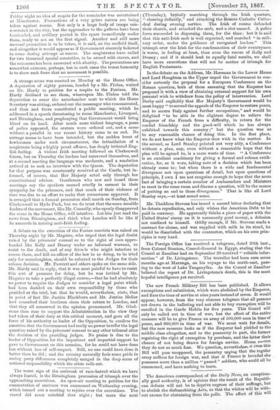A debate on the execution of the Fenian convicts was
raised on Thursday night by Mr. Maguire, who urged that the legal doubt raised by the prisoners' counsel as to the right of men appre- hended like Kelly and Dewy under an informal warrant, to resist to the death, and of any frienis who might interfere to rescue them, and kill an officer of the law in so doing, to be tried only for manslaughter, should be referred to the Judges for their solemn decision. Mr. Fawcett and others spoke on the same side. Mr. Hardy said in reply, that it was most painful to have to resist this sort of pressure for delay, but he was invited by Mr. Maguire to take a perfectly illegal courses—that he had absolutely no power to require the Judges to consider a legal point which had been decided on their own responsibility by those who presided at the trial, but that he would, nevertheless, state, that in point of fact Mr. Justice Blackburn and Mr. Justice Mellor had consulted their brethren since their return to London, and that they all concurred in the opinion pronounced. Mr. Glad- stone then rose to support the Administration in the view they had taken of their duty at this critical moment, and gave all the force of his authority as leader of the Opposition, to =arm the assertion that the Government had really no power to refer the legal question raised by the prisoners' counsel to any other tribunal after the decision of the presiding judges. No praise is due to the leader of Opposition for the important and impartial support he gave to Government on this occasion, for he could not have done less without loss of self-respect. Still, no one could have done it better than he did ; and the country naturally feels some pride in seeing party differences completely merged in the deep sense of national responsibility which the crisis calls out.


































 Previous page
Previous page